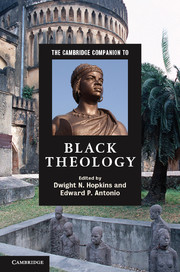Book contents
- Frontmatter
- Part I Introduction
- Part II Themes in black theology
- Part III Global expressions of black theology
- 16 The history of black theology in South Africa
- 17 Black theology in Britain
- 18 Slave religion and black theology in Brazil
- 19 Black theology in Cuba
- 20 Black theology in Jamaica
- 21 Methodology in an Aboriginal theology
- 22 Black theology and postcolonial discourse
- 23 The future of black theology
- Further reading
- Index
- Other titles in the series
22 - Black theology and postcolonial discourse
from Part III - Global expressions of black theology
Published online by Cambridge University Press: 28 September 2012
- Frontmatter
- Part I Introduction
- Part II Themes in black theology
- Part III Global expressions of black theology
- 16 The history of black theology in South Africa
- 17 Black theology in Britain
- 18 Slave religion and black theology in Brazil
- 19 Black theology in Cuba
- 20 Black theology in Jamaica
- 21 Methodology in an Aboriginal theology
- 22 Black theology and postcolonial discourse
- 23 The future of black theology
- Further reading
- Index
- Other titles in the series
Summary
I want to suggest that there are at least five discursive areas where the “postcolonial” opens up spaces of possible articulation with black theology. First, I argue that slave protests, resistance, and contestation of colonial slavery by slaves are situated in and sustained by images of a future society characterized by freedom. Though not named “postcolonial,” this society will answer to that description in its capacity to represent social and political arrangements that have transcended colonial slavery itself. Second, black theology and postcolonial discourse encounter each other in the emergence and development of black critical social theory represented by a long line of black thinkers such as Alexander Crummell, Edward Blyden, Sojourner Truth, W. E. B. DuBois, and many others whose thought sustained the postcolonial imaginary through the production of theory in literature, philosophy, history, religion, and so forth. Third, I shall make reference to certain black movements of thought such as Pan-Africanism, Negritude, and the civil rights movements, which inspired a global vision of a world without colonial domination, as another area of articulation between black theology and postcolonial discourse. Fourth, I propose that we take seriously the global presence of black theology as already securing the relationship between black theology and postcoloniality. Fifth and finally, I conclude the chapter by discussing an important example of black theology's direct participation in postcolonial discourses of the twentieth century through the work of James Cone.
- Type
- Chapter
- Information
- The Cambridge Companion to Black Theology , pp. 298 - 308Publisher: Cambridge University PressPrint publication year: 2012



